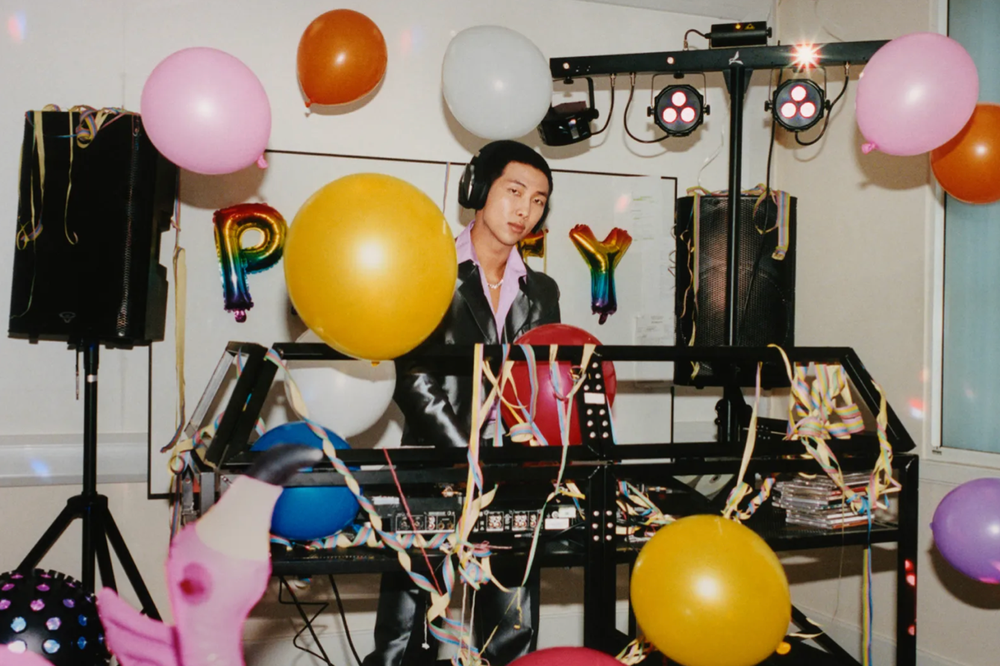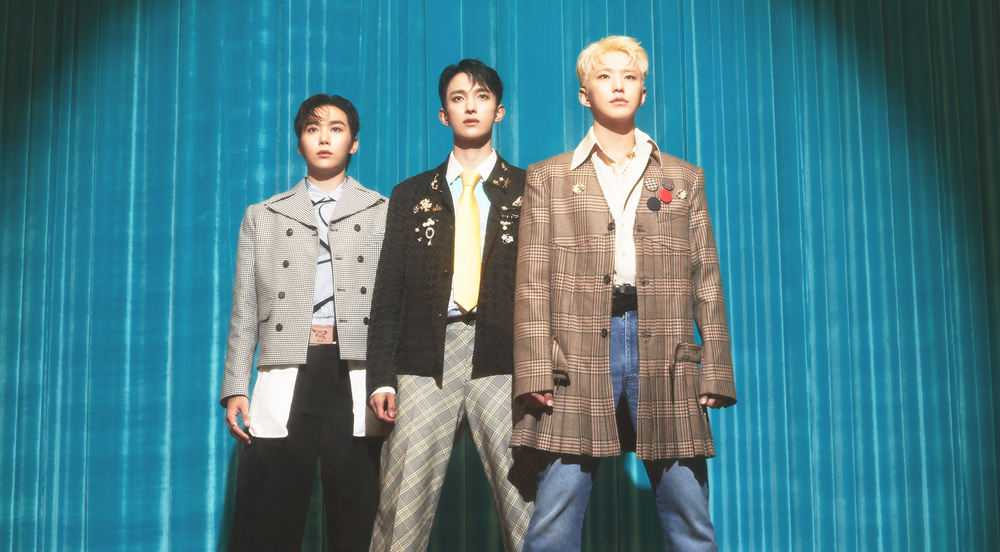Kim Namjoon (김남준), more widely known as RM, has grappled with inner and outer dualities his whole career. In his self-titled mixtape (2015), he depicts himself as a face divided; dichotomies of life and death, light and dark, true and false follow him like a shadow. mono. (2018) creates a gray haven from loud and harsh external pressures. His first solo album, Indigo (2022), navigates the natural permutations of life, as well as unveiling some of the colors that make him who he is. While it reveals new sides to his persona, the inner self was still a bit buried. This new record, Right Place, Wrong Person, is a masterful amalgamation of his inner monologue and is his most honest work yet.
While this album is alternative-indie leaning, it ultimately defies categorization. There is a discordant energy that enjoys not conforming to any particular genre that provides a sense of unpredictability. Simultaneously, there are moments of incredible precision throughout the 11 tracks, each one packed with details that elevate and intrigue. With fearless creativity and a willingness to experiment, Namjoon and his collaborators made something that feels familiar and relatable, yet completely new. Already being named one of the best albums of 2024 so far by Rolling Stone and NME within the first full month of release, the wide consensus is that it is nothing short of a musical triumph.
Even if this album is not to fans’ tastes, it is a release they should be celebrating. This is the same person who shared with Pharrell that he fears growing out of love with music, and more recently to his bandmate, Jimin, he candidly spoke about how he personally needed BTS’ group hiatus. And while he said in a FESTA video that if there is a multiverse he is glad to be a part of BTS in this one, it is not difficult to understand the burdens he has been under as the leader. Coming out on the other side of exhaustion, rage, and disappointment with a project that feels like peering into the pages of his diary, with messages of renewal and finding beauty in life's imperfections, is a testament to Namjoon’s admirable dedication to introspection and artful expression.
The record opens with echoes and vocal loops over synth in “Right People, Wrong Place”, reminiscent of his mixtape mono. The inverse of the title sets the tone for how he interrogates the complexities of relationships to others and the world. Namjoon is “high on a forest fire”; he has settled into the flames of adversity and no longer fights against warring realities. In “Nuts,” he conveys how he could do the supposed ‘right’ thing over and over again, but toxicity will still find him anyway, so now he just won’t try so hard at all. The “Monster hasn’t been me”, a reference to his original stage name ‘Rap Monster,’ communicates further how interchangeable things are.
It might seem like he is uplifting an attitude of complacency, but “out of love,” an industrial hip-hop track, shows how he is instead rewriting morality. "I'm going to burn down all the love and hate, the right, the wrongs”, he declares. With an unhurried bassline, Namjoon reckons with society’s expectations versus desire, and the worry and frustration that come with attempting to live up to those demands. He is frank in addressing his lack of privacy to navigate these things while maintaining a playful delivery.
Namjoon’s aptitude for linguistics makes clever yet intricate lyricism that gives his work an irreplicable fluidity. Language is another instrument in the symphony of his art. Seven tracks are bilingual (Korean/English); three are monolingual (English). One song – “Domodachi”, featuring Little Simz – is a trilingual blend of cultures, languages, and sound profiles. The title takes from the Japanese words ‘domo’ (どうも) and ‘tomodachi’ (ともだち), respectively meaning ‘thank you’ and ‘friend’. But upon reading the biting lyrics, listeners will quickly realize that the title is more sarcastic than sentimental. Saxophone riffs, guitar licks, and ominous chanting in Japanese are the backdrop to Korean and English verses, and a primarily Japanese chorus. Little Simz’ final line is in Korean, emphasizing intercultural understanding.
Genre-crossing and code-switching are devices he employs to question his place in the world. “? (Interlude)”, featuring French-American duo DOMi & JD BECK, is less than two minutes but has an impressive combination of flute, drums, and a synthesizer that strikes contrast. “Around the world in a day” features indie-soul singer Moses Sumney. It’s a tightly wound duet of distorted vocals that starts with acoustic guitar and bedroom soul that transforms into funk-rock and ends with layered acapella harmonies. The movement in this song is akin to a sonata. Similarly to all the featured artists, Namjoon finds himself split between cultures, shifting back and forth.
This album rewards those who make the extra effort to pay close attention. French literary theorist Roland Barthes would have undoubtedly labeled Namjoon’s writing as writerly rather than readerly, which is to say his music requires extra effort from the consumer and should not be experienced passively. This is most accurate for “Groin,” which deserves a deep dive in to fully appreciate the nuance and sass present in this song.
The official music video for "Groin" by RM
There is a great feeling of relief, as if he has been holding his breath for so long and is finally letting it out. The opening line, “There are so many unlucky bastards in the world”, uses the word ‘재수’ (jae-su), which is an ancient Korean word that – when in the context of lacking – describes someone who cannot bring any luck. Even more, it possesses connotations that their unfortunate existence can be others’ karmic punishment. This is the kind of person he is talking about, the people he lacks patience for (“I can’t be a monk”).
Namjoon also includes a reference to a Korean meme at the end of the first verse that gets translated in English to ‘bang’, but that is not what it means at all. ‘빵상’ (bbang-sang) is from an old news story about a woman who claimed to be able to communicate with aliens. This word is what she claimed to be a greeting, but it is more widely understood as gibberish. When he says, “If I don't like someone, I just go bang, bang / Bang, bang, bang, I just go bang, bang”), he is basically saying that the person he dislikes is not worth human words.
Immediately after he goes, “Whatever I do, you can’t stop me now, bang, bang”. This ‘bang’ is different in Korean – ‘방상’ (bang-sang) – and the meaning is a bit unclear. It is speculated that he is referring to a Buddhist practice of planting trees or setting up rocks as a form of defense. Namjoon could be letting people know that he has barriers and protection around him that liberate him to do what he wants over what society might tell him.
When you are no longer oppressed by the insistence of the idea that the world is black and white, home becomes nowhere and everywhere. Despite having a soft and delicate soundscape, there is still a sense of unease that is true to the rest of the project in “Heaven.” He is “happy where the devils are,” basking in an unbreakable peace and even inviting agitators to take a stab at him. But such profound freedom can quickly become daunting. “LOST!” balances this mix of glee, sorrow, and bewilderment effortlessly and its music video visualizes the mazes of time, space, and of the mind. Everything opens up, which can feel disorderly, and there may be temptation to turn back to old ways, but it will eventually turn into something beautiful. He’s “never felt so fine before,” and in “ㅠㅠ (Credit Roll),” Namjoon breaks the sonic fourth wall by asking the audience if they will stick around, now that all his cards are laid out.
Where do you go from here? Who are you after you break out of the false binary of right and wrong? What leads you now?
All of the record’s vulnerability and posed questions about ego and ethics lead to “Come back to me,” a musical slow burn of a final track. Namjoon first debuted this song in August 2023, when he performed it at the final concert of bandmate SUGA’s tour. Unnamed back then, he described it as one of his most treasured songs. For a little over six minutes, subtle percussion and guitars give warmth and comfort. The music video utilizes multiverses and showcases a relatable lack of direction. One timeline shows him tired and unhappy, the other he is smiling and joyful. Rather than opt in to predetermined journeys, he finds a way out of the seemingly endless house, signaling that he is the cause of both his suffering and delight. In the end, however free he becomes after that realization, he is still within confinement. The story is less about totally escaping and more about carving your own path. “You are my pain divine,” he repeats with tenderness. He is free in his own way, he has accepted what has hurt as much as what has been dazzlingly wonderful and is moving forward with lighter steps.
Poetic and vulgar, upset and calm, wise and reckless, and wholly not for mass appeal, ‘Right Place, Wrong Person’ is a raw exploration of the very human fear of wrongness and the accompanying emotions that come with such confrontational self-realization. Namjoon has created an album that effectively acts as a complete and inspiring portrait of sincerity. Should he or anyone, find themselves in the trenches now or again in the future, there is assurance here that things will work out in time.




